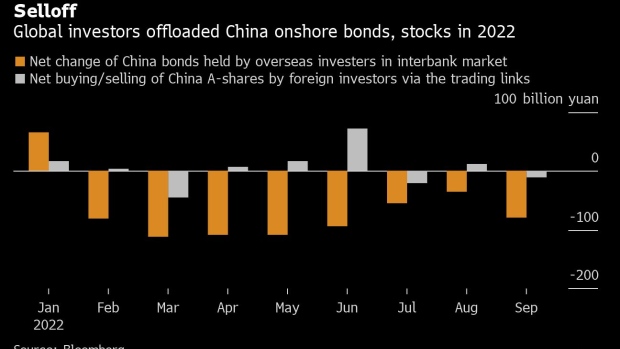Nov 8, 2022
Morgan Stanley Cuts China Annual Inflow Estimate as Risks Mount
, Bloomberg News

(Bloomberg) -- Global funds are likely to return to Chinese assets in 2023 after a withdrawal this year, according to Morgan Stanley which also cut its forecast for inflows through 2030.
Inflows may be capped by a structurally higher risk premia next year following outflows of more than $100 billion in 2022, strategists and economists including Robin Xing and James K Lord wrote in a note. The firm now expects China to attract $120 billion to $200 billion of foreign portfolio inflows annually from 2023 to 2030, versus an earlier forecast of $200 billion to $300 billion.
“Both cyclical and structural headwinds have been driving outflow pressures, which could be alleviated by dissipation of the former -- for instance, an exit from Covid Zero,” the report said. “However, rising investor concerns over China’s long-term outlook -- in light of geopolitical developments and the regulatory reset -- could remain an overhang for some time.
Chinese assets have had a torrid year after Beijing’s strict Covid curbs and tensions with the US sent investors scurrying for the exit. Strategists are trying to determine if stocks, bonds and the yuan have turned a corner as growing chatter about a gradual reopening of the economy fueled a bout of buying in recent days.
Equities will lead the rebound in flows as a growth recovery firms up in the second half of next year, according to Morgan Stanley. But bond buying may resume at a slower pace due to the policy cycle divergence and pending clarity on the onshore bankruptcy and restructuring process.
Read: China Stocks May Rally 20% on a Full Reopening, Goldman Says (1)
If geopolitical tensions escalate and result in broad-based investment bans and meaningful transaction restrictions on Chinese assets, global funds may pull at least $300 billion from onshore shares and bonds, according to Morgan Stanley.
China markets have witnessed capital outflows this year, as global funds cut bond holdings for a record eighth month in September while withdrawing from mainland stocks from Hong Kong.
Headwinds in 2022 were “compounded by investor concerns on China’s future policy direction, heightened after the 20th Party Congress,” Morgan Stanley said. To investors, the increasing focus on security relative to growth in the congress manifesto implied further elevation of non-economic objectives, it added.
Xi’s Power Grab Spurs Historic Market Rout as Foreigners Flee
©2022 Bloomberg L.P.






